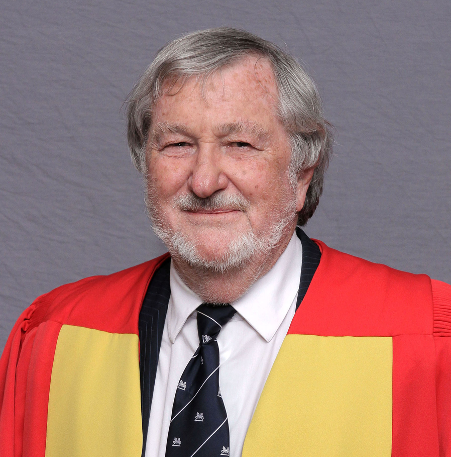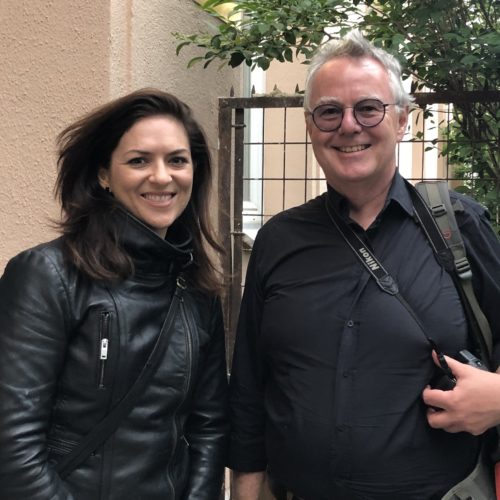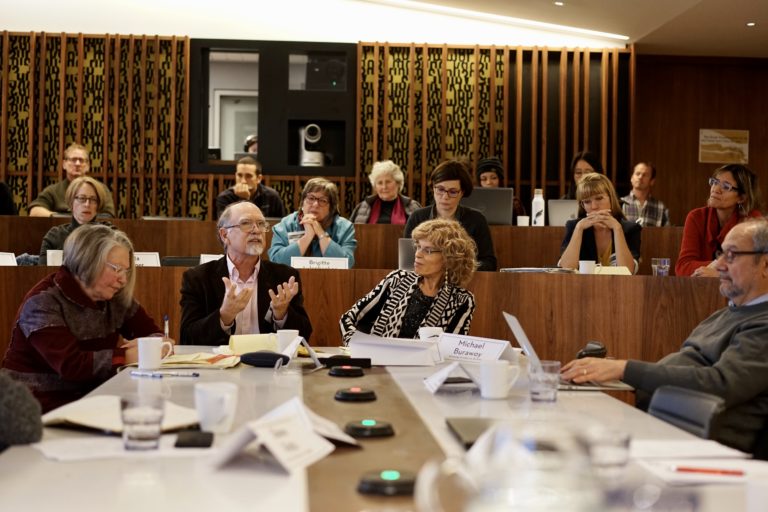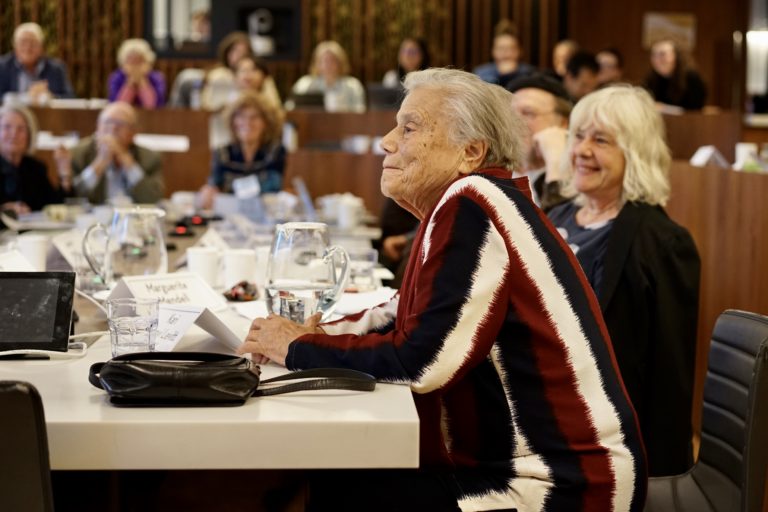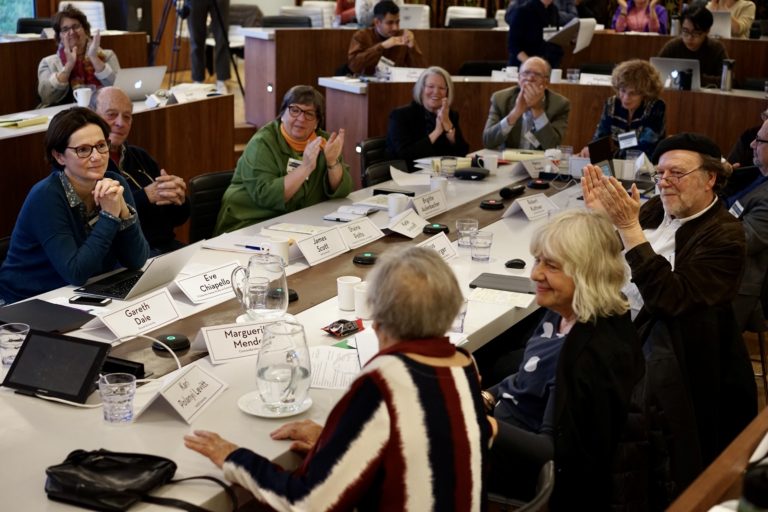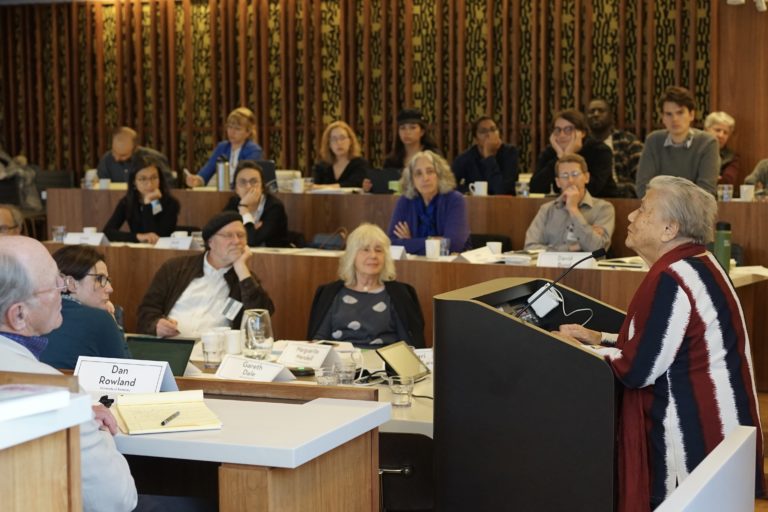Polanyi all over the World
Polanyi in China
In 2007, the first simplified Chinese translation of The Great Transformation was published in mainland China. Today, Chinese scholars not only refer to Polanyi’s theory in order to explain the problems in China’s reform and opening-up process, but also develop a global vision and try to reflect on the structural problems with modern complex societies. The 20 years’ research process can be divided into three stages, as discussed below by Zhang Runkun.
31st of May (Article was written in September 2020)

Zhang Runkun
It was at the end of the 20th century that Polanyi’s work, which has drawn increasing attention on a global scale, was introduced to China alongside with implementation of the reform and opening-up policy which helped to emancipate people’s mind and facilitate global academic communication. In 2007, the first simplified Chinese translation of The Great Transformation was published in mainland China. Today, Chinese scholars not only refer to Polanyi’s theory in order to explain the problems in China’s reform and opening-up process, but also to develop a global vision and try to reflect on the structural problems within modern complex societies. The 20 years’ research process can be divided into three stages, as discussed below.
The First Stage: The Early Introduction
When Polanyi´s thought was first introduced into China, it coincided with the development of China’s reform and opening up to a more in-depth stage. The most important sign of this stage in practice was the beginning of China’s economic and ideological liberalization. A socialist market economy started taking shape, signifying the transition of economic institution from a planned economy to a market economy and the expansion of marketization. However, “socialist market economy” contains the dual dimensions of “socialism” and “market economy” that seem to be somewhat contradictory on the surface, which raises many problems in the practical process of socialist construction. These problems are reflected in the ideological field as discussions about liberalism and socialism. Such discussions have dual characteristics: on the one hand, Chinese scholars have never abandoned the Marxist tradition, nor have they given up their criticism of liberalism; on the other hand, Chinese scholars have begun to rethink “what is socialism”, thinking about how socialism, which includes a market economy and expects to be integrated into a globalized world, is made possible. These questions are not convincingly answered by traditional dogmatic Marxism. In this context, along with the wave of “mind emancipation”, some left-wing Chinese scholars with global perspectives brought Polanyi’s work into academic circles in China. They believed that Polanyi’s issues fit the theoretical and practical problems of China.
During this stage, some works of translation and compilation were undertaken. In 1989, the first Chinese version of The Great Transformation was published by Taiwan Yuan-Liou Publishing Company, but it did not evoke much response at the time, and there was also little research on Polanyi’s thoughts in mainland China. Zhu Guohong’s Sociological Approach to the Economic Phenomena (1998) and Economic Sociology (1999) contain fragmentary introductions to Polanyi’s main works. Zhu Guohong provides extraordinary theoretical resources to reflection on China’s social and economic conditions, but Polanyi’s thoughts have not yet become the protagonist in these two relatively general works. In the new century, Polanyi’s thoughts gradually attracted the attention of Chinese scholars. In 2001, the book Anti-Market Capitalism (edited by Xu Baoqiang and Qu Jingdong) was published. It contains some major chapters of Polanyi’s works, including The Great Transformation, Primitive, Archaic, and Modern Economies, Trade and Market in the Early Empires. The book is prefaced by Wang Hui who offers insightful comments on Polanyi’s thoughts.
In addition to the translation and anthologies, the research on Polanyi’s thought was on its way. During this stage, the research involved three major concerns:
First, Chinese scholars took their interest in Polanyi’s critique of liberalism. In the preface of Anti-Market Capitalism, Wang Hui grasps one of the key issues Polanyi deals with, that is, the debate between liberalism and socialism. Lin Yi briefly introduces Polanyi’s economic thoughts in Polanyi’s Thoughts on Institutional Economics and Its Enlightenment (2001), affirming that Polanyi, like Marx, unveils the historical characteristics of modern capitalist civilization. Lin Yi further points out that Polanyi reminds us that the market economy bearing western imprints is not the sole possible model of a market economy. In the process of reform and opening up, he adds, Chinese scholars ought to avoid blind application of Western economics and figure out a way the system of market economy can be adapted to the social structure of modern China. Deng Weizhi and Qin Qin express similar views in To Find K. Polanyi’s “Reciprocity Economy”: A Discussing about the Paradigm of Market Transition Theory (2004). They argue that the understanding of the market cannot be based only on the view of “western market economies”; it is necessary to use Polanyi’s discussion of reciprocity and redistribution to understand the real market, which is particularly important for understanding China’s market economy in the context of reform and opening up and the violent changes in the Soviet Union and Eastern Europe.
Second, Chinese scholars who have been deeply influenced by Marxism attempted to elucidate how Polanyi’s thoughts are linked and mutually complementary to Marxism. In Wang Hui’s preface, on the one hand, he clearly notices the difference between Polanyi and Marx. On the other hand, he also tries to understand Polanyi with the help of Marx’s theory. He submits three similarities and one difference between Polanyi and Marx. First of all, Polanyi’s “double movement”, as is described in The Great Transformation, which has destroyed the stable state of the 19th century, is exactly the process of Marx’s “natural laws of capitalist production that result in social antagonisms”[1]. Secondly; Marx’s criticism of Proudhon (“He fails to see that economic categories are but abstractions of those real relations, that they are truths only in so far as those relations continue to exist.”)[2] is very similar to Polanyi’s distinction between the substantive and formal meanings of the economy[3]. Third, Polanyi’s method is to return to the actual economic process or economic experience, which saves troubles emerging from the formal economic discipline or ideology. This method is especially suitable for analyzing the actual process of China’s transformation from planning to market. And this method is also very close to the method of inquiry described by Marx in Grundrisse and The Capital, notwithstanding the obvious difference in the method of presentation. Wang Hui also points out that Polanyi does not follow Marx’s optimistic belief in class struggle, and Polanyi has criticized Marxist historical determinism.
Third, Polanyi’s thoughts are increasingly being used to explain the reality of China. Wang Hui points out that the debates between liberalism and socialism should be placed in the context of China’s reform and opening up, the establishment of a market economy, and the world market, with the purpose of finding a theoretical framework and inspirations from Polanyi’s thoughts to respond to the misunderstanding of Chinese conditions at that time. Wang Hui believes that Polanyi should be highly valued in the controversy between liberalism and socialism in the last decade of the 20th century in China. Some scholars argue that even after the reform and opening up, China is constrained by a so-called “shortage economy”, which means that the balance between supply and demand is ascribed not to free market but to the residual influence of the planned economy. In this regard, Wang Hui points out that these scholars have made two methodological mistakes. On one hand, they misunderstood or selectively ignored the phenomenon of price rigidity that also appears in Western economies. On the other hand, they failed to grasp the institutional conditions of the economy and the market that balance supply and demand. Misled by methodologies and limited by ideology, they are far from comprehending the actual operation of the economy, let alone the reforms and market mechanism in China.
The Second Stage: The Research of Core Concepts
With the deepening of reform, the opening up and the rapid development of the market economy, Polanyi’s theory became a wellspring for Chinese scholars to understand emerging social issues. In this stage, the range of reflected themes is expanded. Scholars no longer just reflect on the construction of China’s market economy resultant from the reform and opening up. At the same time, they also grasp the “double movement” as a clue to further study the interaction between market and society, trying to explore the emergence of social problems and the efforts to solve them. During this stage, Chinese scholars’ research on Polanyi’s thoughts shows two trends. The first is to further introduce Polanyi’s theory of social transformation; the second is to research China’ reality through a deeper grasp of Polanyi’s key concepts.
Regarding the first trend, with the publication of the translated version of The Great Transformation in Mainland China in 2007 and further studies on Polanyi’s thought in Chinese academic circles, Karl Polanyi gained greater popularity and influence. To be more specific, efforts were made in two fundamental spheres: One is a new round of introduction and reflection on the latest published Chinese version of The Great Transformation. Related introductory articles emerge in an endless stream, which continue to today. Bao Gangsheng’s Reflections on Karl Polanyi’s Nine Propositions: The Great Transformation Revisited (2014), as an excellent example of these articles, systematically summarizes The Great Transformation. The other is to analyze a series of core concepts in Polanyi’s theory of social transformation. In addition to a brief introduction to The Great Transformation, Bao Gangsheng’s article also discusses the concept of “embeddedness” and “double movement”. He emphasizes that the political dimension should not be ignored when talking about the “embedded” relationship between economy and society. The counter-movement stimulated by a laissez-faire economy is often realized through political means. The “double movement” is not just a question in the economic and social fields.
Regarding the second trend, after Chinese scholars have absorbed Polanyi’s key concepts, they apply them to research on China, which can be subsumed into three main themes.
The first theme is the “double movement” and the transformation of modern Chinese society. In addition to Zhu Guohong, Wang Hui, Xu Baoqiang, and Qu Jingdong, Wang Shaoguang is also one of the earliest scholars in China to read and introduce Polanyi’s works. He talks about the concept and the reality of the “double movement” in the article The Great Transformation: Two-way Movement in China since the 1980s (2008) and the book Polanyi’s The Great Transformation and China’s Great Transformation (2008). It is worth mentioning that Wang Shaoguang’s research on Polanyi mainly grasps the economic and sociological significance, and conducts an in-depth comparative study on the actual situation of China’s reform and opening up. Under the framework of thinking about why and how the “double movement” emerges in China, Wang Shaoguang divides the historical period since the founding of People’s Republic of China (1949) into three parts and highlights the corresponding social and economic policies in these three periods to sketch out the evolvement of the “disembedded” relationship between economy and society, and how the “re-embedding” process is promoted. The first period is from 1949 to 1984, which is called “the period of ethical economy” when the market played a negligible role in social life. Economic relations were completely linked to social-political relations, and all policies were policies in both economic and social sense. The second period is from 1985 to 1998 when the market economy developed rapidly and a large number of economic policies appeared. During the reform of China’s market economy, the “disembedded” phenomenon occurred in form of marketization of medical care, employment and the care for the aged, and thus triggered the counter-movement in the 1990s. Social policies were lacking in this period. The third period started in 1999. Social policies gradually appeared in China, which means efforts were made to re-embed the economy into society through “de-commodification” (showing as the emergence and improvement of unemployment insurance, medical insurance and endowment insurance, etc.). Wang Shaoguang puts these three periods into Polanyi’s “double movement” framework. We can clearly see that his research on Polanyi’s thought pays more attention on the criticism of market economy. However, he pays less attention to the vision that Polanyi’s transformation really pointed to. Perhaps because he attaches more importance to Polanyi’s identity as an economist and sociologist, and ignores the philosophical part of Polanyi’s thought. Although he has noticed the discussion of the ideals of socialism in the final chapter of The Great Transformation, and is also familiar with Polanyi’s ideal of social freedom, he does not fruitfully discuss the problem of freedom and socialism. Thus, he seems to have overestimated the impact of “counter-movements” in his research. In fact, we cannot achieve Polanyi’s ideal only through counter-movement. The operation of the complex society is much more complicated than the vision of a “double movement”. Not only that, Wang Shaoguang’s understanding of the transformation in The Great Transformation may be problematic, but this is basically due to the tremendous and rapid changes that have taken place in China in the past 40 years, which cannot perfectly correspond to Polanyi’s transition era.
The second theme focuses on “self-protection of society” and the socialist market economy system with Chinese characteristics. Meng Jie grasps the issue of commodification that Polanyi paid particular attention to in the article The Commodification of Labor Force and the Development of Employment Relationship Since the Reform: Polanyi and Marx’s Perspective, and enters the discussion of the double movement and social protection issues. Meng Jie provides a lot of empirical evidence, emphasizing that Polanyi’s “double movement” can be used to understand China’s reform and opening up and the construction of a market economy. It is worth noticing that the social protection movement does not only come from state power; attention should also be paid to the power from the bottom of society. This perspective advances Wang Shaoguang’s interpretation of the “double movement” (Wang Shaoguang is mainly concerned with social policy, but he does not see the power of the lower classes). Meng Jie argues that for Polanyi, the protecting movement involves almost all classes whose interests are affected in the process of market expansion. Therefore, Polanyi’s theory has a comprehensive perspective that is more suitable for analyzing China’s unique situation. Meng Jie’s point of view is further explained in 2020. In the article The State Theory in Socialist Political Economics with Chinese Characteristics: The Genealogy, the Object and the System he points out that the “double movement” is also present in the socialist market economy system with Chinese characteristics, appearing as the development of the Chinese labor market and social protection against the commodification of labor. The latter is a social protection movement brought about by state power, which maintains the healthy development of the market economy and is one of the Chinese characteristics of a socialist market economy.
The third theme is the critique of liberal market utopia and the interpretation of the concrete connotation of the socialist road. Chen Gang expresses his criticism of Chinese economic liberalists in Polanyi’s Criticism of Liberal Market Utopia (2009). He thinks that Polanyi has already revealed that the laissez-faire market is a utopia. Even if the market can bring great economic efficiency, the laissez-faire market will only create what Polanyi called a satanic mill. In 2008, China’s reform and opening up process has gone through 30 years, and the question of whether reforms should be further liberalizing is a hot issue in academic circles. Chen Gang accurately grasps the admiration of radical liberal scholars for the free market, but he also emphasizes that the market should be re-embedded into society. This re-embedding process requires the establishment of social values, the cultivation of a cultural atmosphere that respect human dignity, and the use of fairness, justice, humanity, democracy and freedom. It can be seen from the criticism of liberal scholars in this article (although it is not explicitly written in the article) that the 30-year reform and opening up is not just a “double movement” process (in this sense, obviously, the next stage of research must go beyond the limits of Wang Shaoguang’s research approach). It is not a simple movement of liberalization and corresponding regulation. The true significance of the future-oriented reform and opening up lies in the answer to what is socialism and how to build socialism. China’s socialist construction includes the use of capital and globalization, but it is also trying to tame the market and construct a society with freedom. These are precisely the most significant issues that Polanyi has to deal with in Freedom in a Complex Society, the last chapter of The Great Transformation. These are also the issues that the world is facing to, especially after the 2008 financial crisis. The answer to these questions is the key task for the Chinese scholars in the third stage.
The Third Stage: Thinking about the Fundamental Problems of the Modern Society
In recent years, the research of Polanyi in Chinese academic circles has shown a new trend. Under the influence of the aftermath of the 2008 financial crisis, along with the continued development of the crisis, scholars have undertaken more in-depth reflections on neoliberalism and globalization, as well as explanations and discussions on China’s socialism. At this stage, the main focus of Chinese Polanyi researchers is no longer to directly use Polanyi’s concept or theoretical framework to analyze Chinese reality, but to use Polanyi’s perspective and theoretical resources to re-understand the internal crisis of capitalism, exploring possible ways to respond to the fundamental problems of modern society.
The research at this stage first appears as a new round of explanation and research on Polanyi’s thought, showing three aspects. First, Chinese scholars’ understanding of Polanyi is no longer limited to The Great Transformation. For Polanyi-inspired researchers, The Great Transformation is not only a very enlightening work, but it may also become a shackle. Under the background of the new era, with the Chinese version of For a New West (2017) is published, researchers pay more attention to Polanyi’s rich resources outside of The Great Transformation, and also notice the broader issues Polanyi has discussed. Second, the economics, sociology, and philosophy in Polanyi’s thought are all highly valued. In previous studies, philosophical research was not really carried out. The issues of socialism and freedom discussed by Polanyi has not been discussed in depth. Scholars have paid attention to the economical or sociological discussion between Polanyi and Hayek, Ludwig von Mises, Max Weber, etc., but few scholars have studied the theoretical connection between Polanyi and Marx, Habermas, etc. These missing studies are supplemented at the current stage. Third, scholars move from the study of Chinese issues to a global perspective, trying to respond to the fundamental problems of modern society. At this stage, China’s reality is no longer just China’s reality, but turns into the Chinese reality in a global perspective. The domain of problems that scholars think about also expands to resolving the internal structural problems of capitalism and finding a prospect for the modern society. As a result, the Chinese scholar’s attention and the international academic community’s renewed attention to Polanyi’s thought begin to echo each other.
The research mentioned above mainly include four items.
The first is the inherent problems of a complex society and the structural transformation of capitalism. In 2014, Wang Xingfu launches his research on the issue of “complex modernity” in his article Complex Modernity and Social Inclusion. The article attempts to incorporate Polanyi’s critique of the market system and the discussion of freedom in a complex society into Wang Xingfu’s own reflections. In the article, he points out that Hegel’s critique of civil society receives a strong response in Polanyi’s The Great Transformation. Like Hegel, Polanyi also believes that the market system has two important negative characteristics: one is the loss of the ethical, and the other is arbitrariness. For Hegel or Polanyi, even though the market is an indispensable institution in modern society, it is morally problematic and politically harmful. Wang Xingfu points out that although the transformation that Polanyi expects after World War II have not occured, and under the hurricane of neoliberal globalization, society has once again been overwhelmed by the market; the welfare state has been overwhelmed by the market society. That is, the human society once again became what Polanyi refers to as the “satanic mill”. This is the source of many current problems that mankind is facing. Wang Xingfu re-emphasizes that “freedom in a complex society” is the biggest problem of modernity in the international academic workshop “Socialism: An Immanent Dimension of Modern Society” in 2019. He points out that the understanding of Polanyi should not be limited to his critique of liberal market society, but we should also pay attention to constructive aspects in Polanyi’s thoughts. Today, the significance of the latter is to provide clues for thought and to re-think problems of modernity: in a modern world in which a society independent of the state has emerged, is it possible for humans to tame the market? How should the principle of democracy be settled in a modern society? Is it possible to have freedom in the society? In short, how can we embrace both the principle of freedom and the principle of society in the modern world? Wang Xingfu points out that it is necessary to introduce Habermas’s theoretical resources on this issue. In particular, the radical democracy in Habermas’s sense can be connected with Polanyi’s vision of social integration and they can work together to achieve freedom and democracy in a complex society.
The second is the “counter-movement” in the context of the neoliberal capitalist crisis. Zhang Xiaoshuang, in the article Restatement of Polanyi’s Contemporary Significance: Why Marx’s Theory of the State Is Important, points out that the conflict between democracy and freedom under neoliberal conditions stimulates the rise of some radical movements on the one hand, and on the other hand, the possibility of a resurgence of neo-fascism. That reminds us that it is extremely important to re-read Polanyi’s discussion of the repositioning of markets, freedom and democracy under socialist conditions, in consideration of the current condition that the failure of neoliberalism is already clear. Liang Xuecun expresses a similar view in the article Radical Politics in the Tensions of Globalization: The Built-in Conflicts among Capital, State, and Man, and further emphasizes that if the economy continues to pursue progress in a “disembedded” manner, then this will not only create a group of “outcasts”, and their resistance will also lead these outcasts to adopt extreme, violent, and anti-democratic ways to resist. The decline of democratic politics is within view. These so-called outcasts have begun to form a certain strength all over the world. Liang Xuecun points out that the politics of the 21st century must consider such a problem: is the current global capitalism so powerful and all-dominant that ordinary people, labor organizations, civil society and nation-states must obey without any alternative?
The third is the Western left-wing social movement and its dilemma from Polanyi’s perspective. For Polanyi’s readers in China, who are mainly left-wing scholars and scholars who sympathize with Marxism, there are some questions here: how to understand the difference between the “counter-movement” and the left-wing social movement in the context of the impact of neoliberalism and the continuous emergence of social problems? How to understand forms of socialism under different political, social and cultural backgrounds? These are important issues that the Chinese scholars ignored in the first two stages, but it is the focus in the current stage. These issues are of course highly related to previous research, but they have already transcended the scope of the previous topic. As far as the left-wing movement is concerned, a Chinese scholar has translated Nancy Fraser’s A Triple Movement? Parsing the Politics of Crisis after Polanyi into Chinese. The situation and related theoretical reflections of the left-wing social movement have entered the horizon of Chinese researchers.
The fourth is to re-interpret the concept and concrete connotation of socialism. The other pole that corresponds to the left-wing social movement is that we try to give a new interpretation of socialism. Some excellent Chinese scholars are trying to deal with the issues of socialism and freedom in articles and presentations of international conferences. These are very meaningful efforts. There are few articles or books at present, but the prospect of research has already emerged. At present, the Chinese society, with the process of continuously deepening reforms, is still in transformation, and Chinese politicians and scholars are also trying to provide answers about the present and the future of socialism.
[1] See: Preface to the First German Edition, in: Marx & Engels Collected Works, Vol 35, London: Lawrence & Wishart, 1996, p9.
[2] See: Letter from Marx to Pavel Vasilyevich Annenkov, in: Marx & Engels Collected Works, Vol 38, London: Lawrence & Wishart, 1982, p100.
[3] See: The Economy as Instituted Process, in: Trade and Market in the Early Empires, Karl Polanyi, Conrad M. Arensberg, Harry W. Pearson ed., USA: The Free Press, 1957, p243-270.
Zhang Runkun
Zhang Runkun is doctoral student at School of Philosophy, Fudan University. He is interested in Karl Marx and Karl Polanyi's critique on market society
More ‘Polanyi all over the World’:

